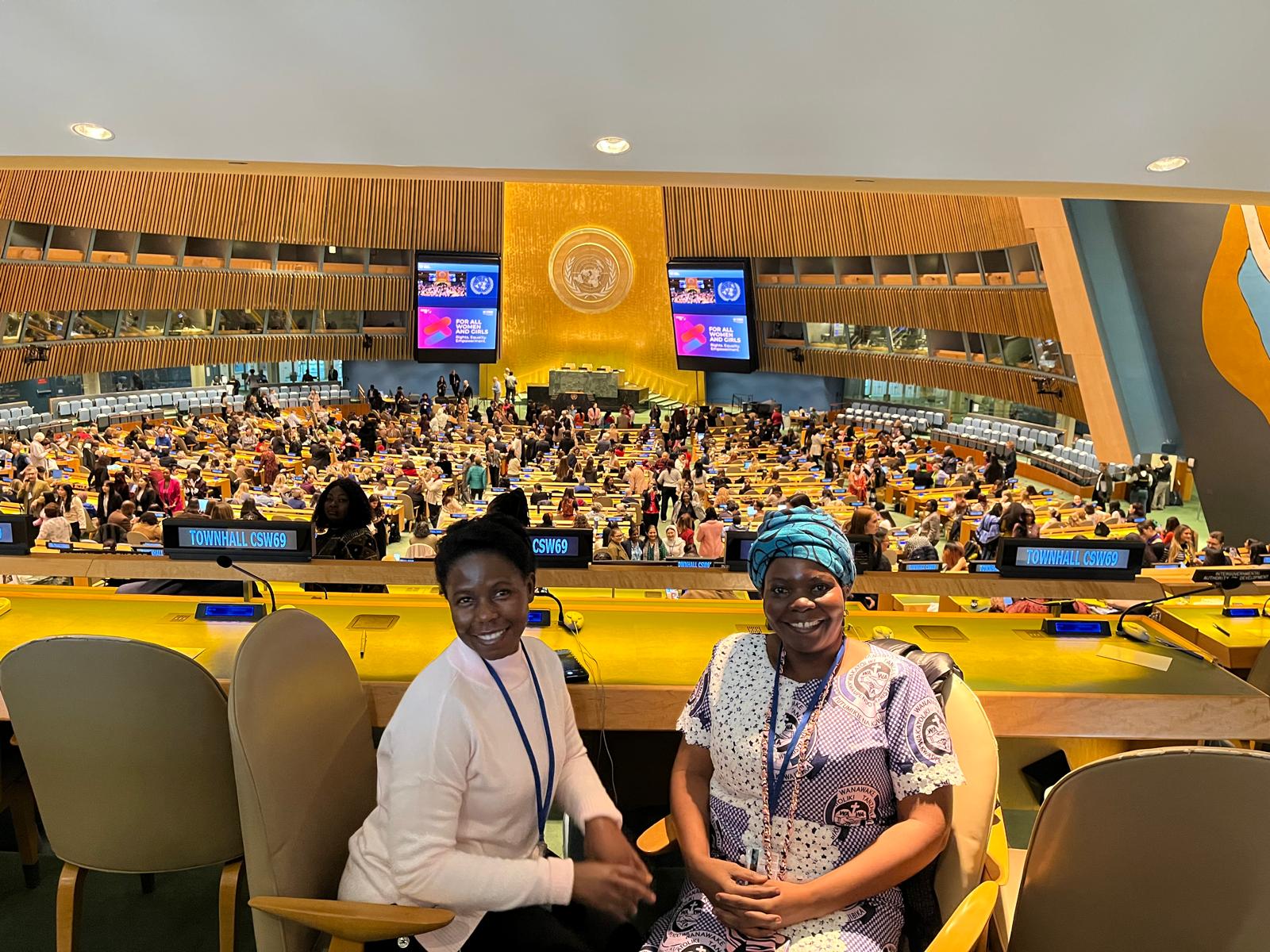Photo of Maryknoll Sisters Felista Wanzagi and Ester Warioba courtesy of Sr. Margaret Lacson, MM.
UN: 69th Session of the Commission on the Status of Women
The global policy-making body dedicated to promoting gender equality and empowering women and girls met at UN headquarters in New York in March.
The UN Commission on the Status of Women gathered at the UN Headquarters in New York City, Mar. 10 through 21, in a session that celebrated the thirty-year anniversary of the Fourth World Conference on Women in Beijing. It was at that conference that then–First Lady Hillary Clinton declared, “women’s rights are human rights.” The task of the 69th Session of the UN Commission on the Status of Women (CSW69) was to evaluate the strides made — and setbacks — in achieving gender equality.
CSW69, also known as Beijing +30, brought together 13,000 participants from 186 member states, including ministers, NGO representatives, faith leaders, and Indigenous women, to reflect on the enduring promise of the Beijing Declaration and Platform for Action (BPFA). Adopted by 189 countries in 1995, the BPFA set strategic objectives and actions for the empowerment of women and girls and the achievement of gender equality across 12 areas of concern, addressing issues ranging from political participation and economic justice to health and education, gender-based violence, and the environment.
The BPFA is not legally binding but it implies a moral obligation for countries to comply. The implementation of the BPFA is evaluated by the CSW every five years to help sustain momentum and keep the urgency of gender equality at the forefront.
The influence of Maryknoll at the Beijing conference in 1994 was strong. The Secretary General of the Beijing Conference, Gertrude Mongella of Tanzania, and the Chair of the Commission on the Status of Women, Dr. Patricia Licuanan of the Philippines, were both alumni of Maryknoll schools. Thirty years later, the Maryknoll presence remains strong at the UN, with Gertrude Mongella rejoining the sessions alongside Maryknoll Sisters Margaret Lacson, Susan Nchubiri, Felista Wanzagi, and Esther Warioba. Representing the Maryknoll Fathers and Brothers was Fr. John Sivalon, MM.
Maryknoll Sisters co-sponsored a parallel event titled Beijing Platform for Action: Women and Church Action for Gender Equality. The virtual event, organized by the Justice Coalition of Religious, was an intergenerational dialogue that explored the experiences of women of faith since the adoption of the Beijing Platform for Action in 1995. As Sr. Lacson explained, “it highlighted the rich history and contributions of religious women, emphasizing the innovative ways they have navigated and worked within patriarchal systems to effect meaningful change.”
For Fr. Sivalon, one of the most poignant moments of the conference came during a panel where Amal Hamad, the Palestinian Authority Minister for Women’s Affairs, delivered an emotional testimony about the impact of war in Gaza on women and girls. “Under the bombardment of Israeli warplanes, children, mothers, spouses, or entire families are being killed,” Hamad said, noting that women and girls account for 73 percent of the total number of civilians killed and wounded.
He also recalled the presentation by the special rapporteur for the rights of woman on how the last few years have led to a denigration of the rights of women and girls because of conflict. “She warned how things could get even worse because of the financial constraints that the UN is now facing. States are not living up to their commitments to the UN.”
Fr. Sivalon also shared about side events concerning gender apartheid in Taliban-controlled Afghanistan, the denigration of women’s rights in conflict settings like South Sudan and Ukraine, and a conversation on the politics of resource extraction in the Democratic Republic of Congo.
While the final Political Declaration, the document that is the fruit bourn by the conference as a concluding statement, failed to adequately incorporate the significance of climate change in women’s equality, the declaration highlighted adolescent girls, gender-based violence, equality in participation, peace and security, care work, and universal health coverage as key issues still affecting women.
Maryknoll Sister Ester Warioba had this to say about the session: “The UN helped me to hear how different countries in the world are working in Beijing +30 declarations either through the same strategies or different strategies to achieve the goal.”
“The Beijing Platform for Action was decided upon 30 years ago,” noted Maryknoll Sister Felista Wanzagi. “And now we have many women who are political leaders in their countries, like the newly appointed vice president in Namibia.” Sister Wanzagi remarked, “The experience at the UN gave me hope for women’s empowerment.”
Faith in action: watch the recording of the Maryknoll Sister-sponsored side-event at the UN CSW69. https://mogc.me/jcor-CSW69

